Understanding ADHD Behavior in Kids: What Every Parent Should Know | Ryan Wexelblatt, LCSW, ADHD Dude

Understanding ADHD Behavior
When my son was younger, I spent years punishing him for behaviors that were hard to manage: screaming, being oppositional, and being destructive in our house. I believed that if I punished him enough, he would eventually behave better. But despite all the punishments, nothing changed.
What I didn't understand then, and what every parent needs to know about ADHD behavior, is that punishment does not teach accountability or build skills. It only creates more frustration for both parent and child. Kids with ADHD do not lack knowledge of what is right or wrong. They struggle with the ability to apply that knowledge in the moment.
Why Punishment Does Not Work
Kids with ADHD have what Dr. Russell Barkley calls a limited time horizon. They are nearsighted in time, meaning they have difficulty connecting their current actions with later outcomes.
When consequences are delayed or not directly related to the behavior, children with ADHD do not make the connection. For example, telling your child, "If you behave all week, you can play video games on Friday," is outside their time horizon. Friday is too far away to be motivating.
Punishment usually comes after the fact and is often driven by emotion. It does not create change. Instead, it teaches avoidance. Kids learn to shut down, hide mistakes, or push back harder.
How "Currency" Teaches Accountability
What I teach now through ADHD Dude Membership focuses on currency; a child's ability to earn their privileges (screen time, access to a special toy, (for teens) access to their phone, etc. Currency is anything that motivates your child.
When expectations are unmet, the child does not earn their currency for that portion of the day. Often, kids with ADHD will seek retribution if they lose all privileges for the day. By breaking up opportunities to earn their currency into 2-3 times per day, we allow them opportunities to be successful. This approach is not about being harsh. It is about teaching accountability in a way that makes sense to a child with ADHD. In the Creating Daily Expectations courses, I teach families to set daily expectations for behavior/cooperation and helping around the house.
When my son was younger, I created an expectation that he would do what was asked within two times of being asked. He did not have to be perfect, but he had two chances to self-correct. He knew he was choosing not to have his currency if he did not follow through.
Over time, he learned to self-correct and become accountable for his choices. That is the kind of learning that lasts.
The Problem With Over-Validating Behavior
Many parenting approaches popular in neurodiverse parenting social media focus on empathy and validation while avoiding expectations and consequences altogether. These ideas sound compassionate and highly appeal to parents struggling to step into parental authority. Yet, this type of approach often backfires on children with ADHD who have a propensity to be inflexible, oppositional, or uncooperative at home.
When parents play "armchair therapist", my term for constantly talking about feelings, processing events, and asking "why" questions, kids do not learn how to make better choices; they only learn that they do not need to be accountable for their behavior choices. This leads to the parent-child hierarchy flipped upside down, where children learn to control their home through their behaviors, because they know it will only be met with empathy, not accountability.
While understanding, patience, and empathy are essential, kids with ADHD need structure and immediate feedback that connects actions to outcomes.
Children feel confident when they know what is expected and how to succeed. They need predictable systems more than explanations.
Building Structure That Works
When parents have systems that make sense, kids can learn accountability without shame. Programs such as Capable & Confident (ages 4-7), Scaffolding Better Behavior (ages 8–17) and Creating Daily Expectations (ages 4-17) provide age-appropriate tools to help families implement this.
These programs focus on practical steps that replace frustration with clarity and help kids learn to be capable and confident in daily life.
The Takeaway
Clear, specific, and realistic expectations work much more effectively than threats of punishment for kids with ADHD.
Start with small, achievable steps:
- I teach parents to implement clear, specific, and realistic expectations, split between behavior/cooperation and helping around the house. The amount of daily expectations varies based on the child's age.
- Tie them to your child's "currency"
- Use language of accountability
You will see accountability grow not through fear or frustration but through a system that helps your child learn responsibility and thrive.
To learn how to implement daily expectations in your home and develop a behavior system designed for families of kids with ADHD, start your parent training today at ADHDDude.com
FAQ
Q: Why doesn't punishment work for my ADHD child?
A: Punishment focuses on control, not teaching. Kids with ADHD often know what's expected but can't apply that knowledge in the moment because of executive function delays. When you punish instead of teach, you increase frustration and shame without helping them build self-control.
Q: What's the difference between punishment and consequences?
A: Punishment is reactive; it's about making a child feel bad after a mistake. Consequences are proactive; they connect behavior to outcomes in a way that makes sense to the child. A well-timed, consistent consequence helps kids learn accountability instead of fear.
Q: How do I set consequences that actually work?
A: Keep them immediate, consistent, and tied to something meaningful to your child, their "currency." For example, if your child ignores directions, they might lose a small privilege immediately. Delayed or emotional reactions lose their impact.
Q: What if I've been using punishment for a long time?
A: It's never too late to shift. Start by setting two clear daily expectations and connecting them to specific privileges. Focus on follow-through rather than emotion. Over time, consistency teaches your child self-regulation and helps rebuild trust between you.
Q: How should I respond when my child's behavior becomes aggressive or physical?
A: Aggression requires a clear, calm safety response. Learn how to handle these situations step-by-step in what to do when your ADHD child is hitting you; it walks you through how to stay composed, set firm boundaries, and prevent escalation safely.










